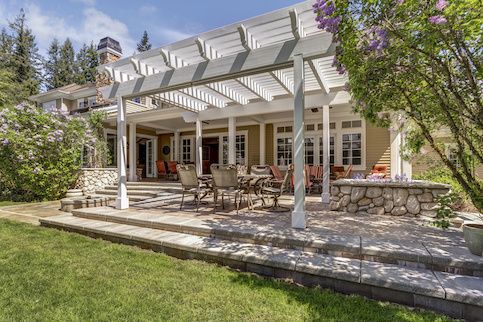When you get a mortgage, it might be natural to assume you’ll have a set monthly payment that will never change for as long as you’re paying back your lender. While this may be the case until you finally pay down your mortgage and the home is completely yours, it’s very likely that your monthly mortgage payment will fluctuate over the life of the loan.
This can happen as a result of having an adjustable-rate mortgage (ARM) where the interest rate changes after a certain number of years, or it can happen for a number of other reasons.
If you’re wondering why your mortgage payments have gone up or are about to go up, keep reading on to discover why you might be seeing a change.
Why Would My Mortgage Payment Go Up?
As just noted, a mortgage payment can change for multiple reasons. Let’s explore some of them momentarily.
Escrow Changes
Changes in the price of your property taxes or homeowners insurance are among the most common causes of a mortgage payment increase. These funds are traditionally held in an escrow account connected with your mortgage payment.
Escrow accounts are helpful because they allow you to divide your property tax and homeowners insurance bills into 12 equal monthly payments rather than paying them in a lump sum every year. When your property taxes and/or homeowners insurance increase, so will the amount that’s needed in escrow.
Escrow Shortage/Overage
Local taxing authorities assess property values for tax purposes at different times. Because your taxes and insurance costs won’t always change while your escrow is analyzed, you may end up with a shortage or overage in your escrow account.
If your property taxes or homeowners insurance costs go down, you’ll receive a check for the overage amount you paid. Dealing with a shortage is slightly different. First, you don’t have to worry about getting in trouble with your taxing authority or insurance company, because your mortgage lender will pay in your stead whatever amount is due. The downside with this scenario, though, is that your monthly mortgage payment will increase.
If you’re facing an escrow shortage, you have a couple of options for dealing with it:
- You can pay off the amount of the shortage in one lump sum.
- You can spread the shortage out over the next year by having a higher monthly mortgage payment.
A large shortage can come about if you change your homeowners insurance. When you cancel your policy, you’ll receive a prorated refund check for the remaining time on the policy. To avoid a shortage, you must send this check to your mortgage servicer to be applied to your escrow account.
It’s important to stay on top of your escrow payments to avoid surprise changes in your mortgage. Pay attention tothe direction that your escrow account has been trending, so you can plan and make adjustments if necessary.
Mortgage Insurance Removal
While making at least a 20% down payment on a home purchase is always optimal, a number of low down payment options do exist. But they often come with a caveat. For instance, in exchange for a down payment option as low as 3% on a conventional loan, you’ll have to pay for private mortgage insurance (PMI).
PMI will make your monthly mortgage payment go up, but you won’t have to pay it anymore once you reach 20% equity in the home. As a result, you’ll have a lower monthly payment.
Mortgage insurance requirements vary by loan type, however. For example, a USDA loan doesn’t technically require mortgage insurance but comes with what’s known as a guarantee fee that entails a one-time upfront fee and an annual fee that’s broken down into monthly payments included in your monthly mortgage payment. These fees are 1% and 0.35% percent of the loan balance, respectively.
FHA and conventional loans, meanwhile, each have their own set of guidelines, which we’ll look at in just a moment.
Removing FHA MIP
If you have an FHA loan that closed on or after June 3, 2013, you can only remove the mortgage insurance premium (MIP) if you’ve made a down payment of 10% or more and paid mortgage insurance for at least 11 years. If your down payment is lower than 10%, you’ll make MIP payments for the life of the loan.
If your loan closed before June 3, 2013, MIP can be removed when you reach 22% equity in your home, regardless of down payment amount or the number of years that have passed since you started making mortgage payments. If you no longer have to make MIP payments, your monthly mortgage payment will decrease no matter whether your MIP ends after 11 years or at 22% equity.
If you wish to stop paying mortgage insurance premiums but they can’t be removed, look into refinancing into a conventional loan.
Removing Conventional Loan PMI
PMI, which is unique to conventional loans, can be avoided entirely by making a down payment of 20% or more. Or, as already mentioned, it can be canceled later once you’ve achieved 20% equity in your home.
There are some exceptions to this rule, however, so it’s best to check with your lender on when you’ll be able to drop PMI from your monthly mortgage payment.
Service Member Benefits
The Servicemembers Civil Relief Act (SCRA) covers service members from the date they enter an active duty cycle until 1 year following the end of an active-duty assignment. During this period, those on active duty are entitled to certain SCRA benefits, including:
- No requirement to pay late fees
- Your lender not being able to foreclose on you
- An interest rate that can’t exceed 6% during active-duty service
ARM Adjustments
As mentioned earlier, if you have an adjustable-rate mortgage (ARM), this could be the reason – or one of multiple reasons – your mortgage keeps going up. All ARMs start with an initial rate on the front of the loan, but unlike with a fixed-rate mortgage, that initial rate will change after a certain number of years.
If you have a 7-year ARM, for example, your payment is going to stay fixed at the initial rate for 7 years. This ARM payment option would be marketed as a 7/6 ARM. The second number refers to how many times per year the rate adjusts at the end of the fixed period. In this case, the rate adjusts every 6 months.
When it’s time for your ARM to adjust, it goes up or down based on a couple of indexes, depending on the investor in your mortgage. If you have a conventional loan through Fannie Mae or Freddie Mac, your interest rate is adjusted based on the 6-month Secured Overnight Financing Rate (SOFR).
If you have an FHA loan or a VA loan, your interest rate adjustment is based on the 1-year Constant Maturity Treasury (CMT). This index number is then added to a margin to get your rate.
Additionally, some caps are associated with your loan. For instance, you might see one labeled as 2/1/5, which means:
- 2: There’s a 2% increase/decrease cap on the initial adjustment.
- 1: The rate won’t increase/decrease more than 1% each adjustment after that.
- 5: The rate won’t increase/decrease more than 5% for the life of the loan.
Amortization Calculator
Use our amortization calculator to see how your monthly payment breaks down and how additional payments can save you money on interest.
See What You Qualify For
Buy A Home
Discover mortgage options that fit your unique financial needs.

Refinance
Refinance your mortgage to have more money for what matters.
Tap Into Equity
Use your home’s equity and unlock cash to achieve your goals.
FAQs: Why Did My Mortgage Go Up?
Let’s take a look at a few frequently asked questions about why your mortgage payment is going up or may increase in the future.
Why would my mortgage payment go up?
You could see a rise in your mortgage payment for a few reasons. These include an increase in your property tax, homeowners insurance premium, or both. Your mortgage payment will also go up if you have an adjustable-rate mortgage and your initial rate has come to an end.
Can my mortgage go up because of escrow?
Yes, your mortgage payment can increase because of escrow, which is the account from which your lender makes your property tax and homeowners insurance payments. If property taxes go up or the cost of your homeowners insurance rises, you’ll have what’s known as an escrow shortage, which means there’s not enough money in the escrow account to cover the cost of your property taxes or homeowners insurance.
As a result, your monthly mortgage payments – which include monthly homeowners insurance fees and property taxes that you pay your lender so the lender can make the payments on your behalf – will increase unless you decide to pay the cost of the shortage in a single lump sum.
How can I stop my mortgage payments from increasing?
It’s possible, in a few ways, to stop your monthly mortgage payments from increasing. These include a refinance of your loan to a lower interest rate (if rates are lower than when you got your original mortgage), shopping around for a better homeowners insurance policy, and eliminating mortgage insurance, if possible. Or, as mentioned, you can keep your payments from increasing by paying any escrow shortage in a lump sum.
The Bottom Line: Your Mortgage Payment Can Go Up After A Year
Your mortgage payment can increase for various reasons, so keeping track of them all can be a challenge. If you own your home, have an adjustable-rate mortgage and want to limit how much your mortgage payment can change from year to year, consider a refinance to a fixed-rate mortgage. This won’t eliminate the potential for changes in your monthly payment due to other factors, but you can at least be assured the changes won’t come as a result of a hike in your interest rate.
See what you can afford.
Quicken Loans® can help you find a lender.

Victoria Araj
Victoria Araj is a Staff Writer for Rocket Companies who has held roles in mortgage banking, public relations and more in her 15-plus years of experience. She has a bachelor’s degree in journalism with an emphasis in political science from Michigan State University, and a master’s degree in public administration from the University of Michigan.












